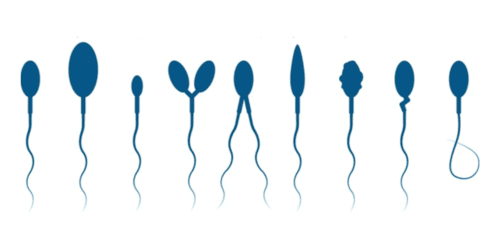
What is Male Infertility and How Does it Impact Conception?
Male infertility is an issue that affects almost half of all couples who are having trouble conceiving. If you have been trying to conceive for more than 12 months without success, or 6 months if you are over 35, then you may be experiencing male infertility and it’s beneficial to book a consultation at a fertility clinic.
Being told you have fertility problems and you may not be able to conceive naturally can be upsetting. There are lots of fertility treatments available to explore and you shouldn’t put off speaking to a fertility specialist. Male factor infertility is the second biggest fertility issue after a woman’s age and below we have looked into how it can impact conception in more detail.
What Causes Male Infertility?
Male infertility is caused by problems that affect sperm production or the transport process. Sperm count/sperm concentration, sperm motility (movement) and sperm morphology (shape) can cause issues with fertility. See images below.
Some causes of male fertility issues are;
- Age is also a factor that can affect male infertility and although age isn’t as significant as it is with women, sperm quality declines after the age of 45 and time to pregnancy also increases.
- Hormone imbalance, such as hypogonadism (reduced hormone production)
- Genetic problems, such as Klinefelter syndrome
- Having had undescended testicles as a baby
- Structural problems – for example, the tubes that carry sperm being damaged and blocked by illness or injury, or being absent from birth
- STDs and genital infections such as chlamydia, gonorrhoea or prostatitis (infection of the prostate gland)
- Varicoceles (enlarged veins in the testicles)
- The testicles becoming overheated frequently
- Excessive alcohol consumption, smoking and drug use, such as cocaine and marijuana.
- Certain medications, including testosterone replacement therapy, long-term anabolic steroid use, cancer medications (chemotherapy)
- Being overweight or obese.
How Can Male Infertility Be Identified?
While many cases of male infertility can be successfully treated, it’s essential to be aware of the potential causes and seek treatment as soon as possible. One of the best ways to identify whether you are experiencing male factor fertility problems is to book a male fertility test. This test involves analysing a semen sample. This is called a Semen Analysis.
During a male fertility test, a semen sample is usually produced by masturbation and then assessed in the lab. The sperm in the sample will be assessed for several factors, including; sperm count/sperm concentration, sperm motility and sperm morphology. Semen analysis tests will also check for anti-sperm antibodies.
Not only can semen analysis results be used to diagnose male infertility, but they can also be used to help create a fertility treatment plan that will help you conceive.
How Does Male Factor Infertility Impact Conception?
Male infertility can prevent couples from being able to conceive naturally. Experiencing common problems like low sperm count or motility can make it harder for sperm to fertilise an egg and poor-quality sperm can reduce the likelihood of natural conception. Depending on what problems were identified during the semen analysis, male factor infertility can be treated with medications, lifestyle changes or in some cases, fertility treatments.
What Fertility Treatments are Available to Help With Male Infertility?
There are a few different assisted reproductive technologies available for couples who are struggling to conceive naturally due to male factor infertility. A fertility expert will discuss your semen analysis results with you and recommend the most suitable treatment options for your individual circumstances. What has caused the abnormalities in your sperm and what type of problems were identified during the semen analysis will impact which fertility treatments have the best chance of success for you and your partner.
There are a couple of fertility treatments that are commonly used to help couples with male infertility. Intrauterine Insemination (IUI) or In Vitro Fertilisation (IVF) may be suggested to increase the likelihood of pregnancy. For some couples, more advanced fertility treatments may be required such as Intracytoplasmic Sperm Injection (ICSI). These treatments can help to improve pregnancy rates and lower miscarriage rates for couples experiencing male-factor infertility.
Booking a Male Fertility Test
If you have been trying to conceive naturally but you haven’t been successful, it’s worth contacting a fertility clinic and booking a fertility test. There are many benefits associated with gaining a better understanding of your fertility and a fertility expert can help you to realise your dream of having a baby.
Here at Complete Fertility, we provide comprehensive fertility testing for both men and women, and we use fertility test results to create bespoke treatment plans for our patients. We have cared for thousands of patients and we strive to bring the joy of a family to people experiencing fertility problems. We pride ourselves on providing a confidential, professional, and caring service, and you can contact our team to find out more.



